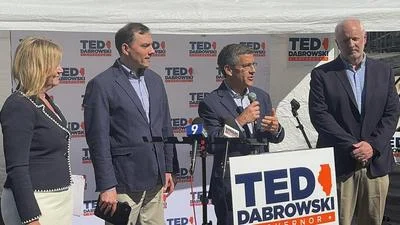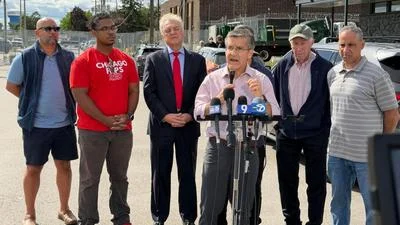Adam Schuster, Illinois Policy Institute's director of budget and tax research, is taking aim at state lawmakers for the Illinois Senate's recent passage of a spending bill without doing anything to rein in government spending.
In a recent article for the Illinois Policy Institute, Schuster calls out legislators for "bad budgeting" and unrealistic income projections.
"Once again, state lawmakers have kicked the can on making the tough choices necessary to put Illinois on a path toward fiscal health," Schuster wrote.
"On May 30, the Illinois Senate approved a spending bill that exceeds realistic revenue projections by as much as $1.5 billion, while failing to enact meaningful reforms to rein in the cost of government," he wrote.
In his article, Schuster pointed to the fact that the 1,245-page bill had only been made public less than five hours prior to the legislative vote. He also highlighted the fact that the state has not passed a balanced budget in nearly 17 years.
"Bad budgeting, especially during election years, is a long-running practice in Illinois," Schuster wrote.
"Based on previous state revenue estimates, the fiscal year 2019 budget passed by the Senate is out of balance by between $635 million and $1.5 billion, and includes no structural reforms to the key cost drivers of state spending," he wrote.
Schuster wrote that those who will suffer from the state's lack of a budget and out-of-control spending are Illinois families and businesses.
"Uncertainty around the state budget – and the looming possibility of future tax hikes to close deficits – makes it difficult for families and businesses to plan their futures in Illinois and harms the state’s economy," Schuster said in his piece.
Schuster wrote that what is needed is for the state to adopt a "spending cap" amendment to Illinois' Constitution that would restrict lawmakers from spending money the state does not have.
"Illinois lawmakers have already proved they cannot exercise fiscal restraint on their own and have skirted the existing balanced budget requirement in the state constitution," Schuster argues.
"Rather than arguing over unreliable revenue estimates, a spending cap would give lawmakers a reliable number to plan around," he wrote in his article.
Schuster makes the case that a spending cap could also result in a surplus revenue for the state.
"For the most recent 10-year period, Illinois’ economy grew at an average rate of 2.4 percent each year," Schuster stated. "The fiscal year 2018 budget called for $36.054 billion in spending, according to (Commission on Government Forecasting and Accountability). Applying a 2.4 percent growth rate means the fiscal year 2019 budget would be able to increase by $865 million, for roughly $36.9 billion in total spending," he said.
"Using the COGFA revenue estimate as a base, this would have given the state a surplus of hundreds of millions of dollars that could be used to help pay down the bill backlog," Schuster wrote.
He also said that the state pensions and administrative "bloat" are overwhelming basic government services.
"House members should immediately reject the unfunded spending plan passed by the Senate and adopt a responsible budget in its place," Schuster stated in his article.
"Doing so would finally send a signal to Illinois residents that lawmakers are serious about ending Illinois’ fiscal crisis," he said.






 Alerts Sign-up
Alerts Sign-up